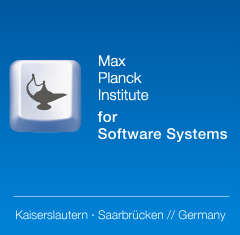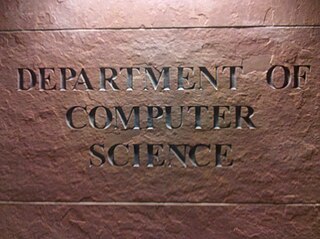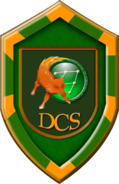
Computing is any goal-oriented activity requiring, benefiting from, or creating computing machinery. It includes the study and experimentation of algorithmic processes, and development of both hardware and software. Computing has scientific, engineering, mathematical, technological and social aspects. Major computing disciplines include computer engineering, computer science, cybersecurity, data science, information systems, information technology and software engineering.

Computer science is the study of computation, automation, and information. Computer science spans theoretical disciplines to practical disciplines. Computer science is generally considered an academic discipline and distinct from computer programming which is considered to be a technical field.
A computer scientist is a scholar who specializes in the academic study of computer science.

Jack Joseph Dongarra is an American computer scientist and mathematician. He is the American University Distinguished Professor of Computer Science in the Electrical Engineering and Computer Science Department at the University of Tennessee. He holds the position of a Distinguished Research Staff member in the Computer Science and Mathematics Division at Oak Ridge National Laboratory, Turing Fellowship in the School of Mathematics at the University of Manchester, and is an adjunct professor in the Computer Science Department at Rice University. He served as a faculty fellow at the Texas A&M University Institute for Advanced Study (2014–2018). Dongarra is the founding director of the Innovative Computing Laboratory at the University of Tennessee. He was the recipient of the Turing Award in 2021.
Computational science, also known as scientific computing, technical computing or scientific computation (SC), is an area of science that uses advanced computing capabilities to understand and solve complex physical problems. This includes

The Courant Institute of Mathematical Sciences is the mathematics research school of New York University (NYU), and is among the most prestigious mathematics schools and mathematical sciences research centers in the world. Founded in 1935, it is named after Richard Courant, one of the founders of the Courant Institute and also a mathematics professor at New York University from 1936 to 1972, and serves as a center for research and advanced training in computer science and mathematics. It is located on Gould Plaza next to the Stern School of Business and the economics department of the College of Arts and Science.
NUST School of Electrical Engineering and Computer Science (NUST-SEECS), formerly NUST Institute of Information Technology, is a constituent school in Islamabad, Pakistan. It was created on a self-financed basis in April 1999 as a constituent college of National University of Sciences and Technology, Pakistan (NUST). It was formed due to the demand for quality IT education in the country and the requirement for NUST to launch its own IT department.
The School of Engineering and Applied Science (SEAS) at the George Washington University in Washington, D.C. is a technical school which specializes in engineering, technology, communications, and transportation. The school is located on the main campus of the George Washington University and offers both undergraduate and graduate programs.

The Max Planck Institute for Software Systems (MPI-SWS) is a computer science research institute co-located in Saarbrücken and Kaiserslautern, Germany. The institute is chartered to conduct basic research in all areas related to the design, analysis, modeling, implementation and evaluation of complex software systems. Particular areas of interest include programming systems, distributed and networked systems, embedded and autonomous systems, as well as crosscutting aspects like formal modeling and analysis of software systems, security, dependability and software engineering. It joins over 80 other institutes run by the Max-Planck-Gesellschaft, which conduct world-class basic research in medicine, biology, chemistry, physics, technology and the humanities.

The Donald Bren School of Information and Computer Sciences, also known colloquially as UCI's School of ICS or simply the Bren School, is an academic unit of University of California, Irvine (UCI), and the only dedicated school of computer science in the University of California system. Consisting of nearly three thousand students, faculty, and staff, the school maintains three buildings in the South-East section of UCI's undergraduate campus, and maintains student body and research affiliations throughout UCI.

Computational Engineering is a relatively new discipline that deals with the development and application of computational models for engineering. As an emerging field, there is still some ambiguity as to what constitutes Computational Engineering. Some see it as a mostly simulation-driven approach to engineering challenges. Others see it as a way to use computer algorithms to mimic the way engineers work, sometimes coupled with some aspect of AI.
The Laboratoire d'Informatique de Grenoble is the largest research laboratory of Informatics in Grenoble, France. It was created 1 January 2007, as the result of a union of the 24 research teams of the previous IMAG Institute and the INRIA Rhône-Alpes.

The College of Engineering of the University of the Philippines Diliman is the largest degree-granting unit in the U.P. System in terms of student population. The college is also known formally as UP COE, COE, and informally as Eng'g.
Informatics is the study of computational systems. According to the ACM Europe Council and Informatics Europe, informatics is synonymous with computer science and computing as a profession, in which the central notion is transformation of information. In other countries, the term "informatics" is used with a different meaning in the context of library science, in which case it is synonymous with data storage and retrieval.
The UBC Computer Science department at the University of British Columbia was established in May 1968. UBC CS is located at the UBC Point Grey campus in Vancouver, British Columbia, Canada. As of September 2022, it has 65 faculty, 62 staff, 248 graduate students, and 2,763 undergraduates.

The Computer Science Department at the University of Colorado Boulder is an academic department in the College of Engineering and Applied Science focusing on the teaching and research of Computer Science. The department was founded in 1970 and was later inducted into the College of Engineering and Applied Science in 1980. The department offers both undergraduate and graduate degree programs as well as a minor in Computer Science.

The University of Illinois Department of Computer Science is the academic department encompassing the discipline of computer science at the University of Illinois at Urbana-Champaign. According to U.S. News & World Report, both its undergraduate and graduate programs rank in the top five among American universities. The department ranks equally high in faculty submissions to reputable journals and academic conferences, as determined by CSRankings.org. According to Computer Science Open Rankings, the department ranks equally high in placing Ph.D. students in tenure-track positions at top universities and winning best paper awards. From before its official founding in 1964 to today, the department's faculty members and alumni have contributed to projects including the ORDVAC, PLATO, Mosaic, JavaScript and LLVM, and have founded companies including Siebel Systems, Netscape, Mozilla, PayPal, Yelp, YouTube, and Malwarebytes.


















